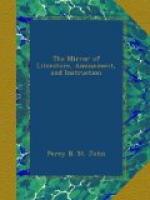“At Brighton, my wheels rattled along the cliffs as briskly and as loudly as the noblest equipage there; but no female turned a glance of recognition towards my windows, and the eyes of former friends were studiously averted. I bore my lady through the streets, and I waited for her now and then at the door of the theatre; but at gates of respectability, at balls, and at assemblies, I, alas! was never ‘called,’ and never ‘stopped the way.’ Like a disabled soldier, I ceased to bear arms, and I was crest-fallen!
“This could not last: my mistress could little brook contempt, especially when she felt it to be deserved; her cheek lost its bloom, her eye its lustre; and when her beauty became less brilliant, she no longer possessed the only attraction which had made the captain her lover. He grew weary of her, soon took occasion to quarrel with her, and she was left without friends, without income, and without character. I was at length torn from her: it nearly broke my springs to part with her; but I was despatched to the bazaar in London, and saw no more of my lady.
(To be continued.)
* * * * *
FASHIONABLE NOVELS.
It is well that hard words break no bones, else two or three gentlemen of literary notoriety would be in a sorry plight after reading the following passage in a recent Magazine. We stand by, and like the fellow in the play, bite our thumb:—
“Surely, surely, all men, women, and children, not cursed with the fatuity that would become a vice-president of the Phrenological Society, must by this time be about heartsick of what are called Novels of Fashionable Life. Only two men of any pretensions to superiority of talent have had part in the uproarious manufacture of this ware, that has been dinned in our ears by trumpet after trumpet, during the last six or seven years. Mr. Theodore Hook began the business—a man of such strong native sense and thorough knowledge of the world as it is, that we cannot doubt the coxcombry which has drawn so much derision on his sayings and doings was all, to use a phrase which he himself has brought into fashion, humbug. He could not cast his keen eyes over any considerable circle of society in this country, without perceiving the melancholy fact, that the British nation labours under a universal mania for gentility—all the world hurrying and bustling in the same idle chase—good honest squires and baronets, with pedigrees of a thousand years, and estates of ten thousand acres—ay, and even noble lords—yea, the noblest of the noble themselves (or at least their ladies), rendered fidgety and uncomfortable by the circumstance of their not somehow or other belonging to one particular little circle in London. Comely round-paunched parsons and squireens, again, all over the land, eating the bread of bitterness, and drinking the waters of sorrow,




